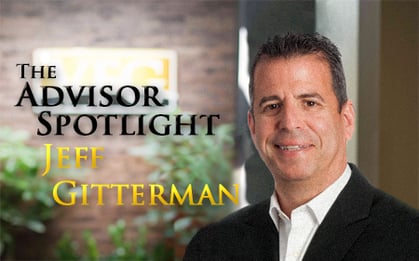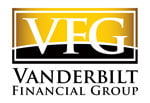
Editor’s Note: Each month Vanderbilt Financial Group features an advisor in the Vanderbilt family who exhibits the VFG values of Gratitude, Respect, Innovation, Teamwork and Trust on a consistent basis. These values impact their work with clients and VFG staff, and ultimately pushes for an excellence in their business practices that is unparalleled and incredibly unique. Beyond high-level producers, these advisors offer sage advice and best practices for boosting your business on your terms according to your values. This month’s Advisor Spotlight features Jeffrey Gitterman of Gitterman Wealth Management.
Give us a little information on your background and what drove you into the financial services industry.Growing up I had an Uncle who was in the Financial Services industry and saw that he seemed to have a bit of an easier, freer life. My parents worked in retail and had a more difficult life, not in control of their destiny, laid off at times. Even then, as a child, watching those events unfold, I realized that I wanted control over my time and my income. I wanted the control over my life that my uncle had over his.
What books, authors or thought-leaders have shaped the way you think? What about currently?
Most of the books that I read have to do with spiritual, self-help, psychotherapy and marketing topics. The book that had the biggest impact over my life is “Marketing to the Affluent” by Dr. Tom Stanley, which I read in 1989. This book made me realize there was benefit to focusing on a target market over being a generalist. It was fundamental in my being able to build a practice over the last 29 years, one that is mostly focused on college faculty.
Today I read books focusing on climate change and the collapse of civilization, and how to factor climate risk into portfolios and things of that nature. It’s certainly not the lightest of reading, but I think these are important topics very relevant to our industry.
(Editor’s note: Jeff is the author of “Beyond Success: Redefining the Meaning of Prosperity” with the subtitle ‘Wealth Management for the Soul’ that combines a good deal of his personal spirituality practices with his professional ones.)
What do you enjoy most about working in a client-facing role?
Money is a very difficult and intangible topic for people. I have always viewed the role of an advisor as more of a theologian than a professional practitioner, because in many ways, money is based on faith more than it is based on science. I have an ability to help clients have a sense of calm about their future and their money. At least in part, I think some of my college professor clients ventured into their profession so that they don’t have be in the “real world” as much as the average person, and many of them don’t have a good relationship with money. I bridge that gap by helping to provide them with peace and comfort about their future. That sense of calm that I can give them is what I enjoy the most.
What’s the most challenging aspect of working with clients? What are some best practices you employ in overcoming these challenges?
Definitely the fact that clients have the benefit of a backward-looking view of return. When clients are measuring your success as an advisor, they are looking back and comparing you to the stock market. Are you doing a good job or a bad job? They have the benefit of hindsight, which we, as financial planners, don’t have. We have to base the risk they have on the downside, not the risk they have on the way up, and make that connection for them in their investments and portfolios. Some clients have a hard time understanding that connection and it can be the hardest part of this business.
A best practice I employ is setting client exceptions around the return they need to live a comfortable life versus basing exceptions around the market and market returns. Bring the client back to look at what we went into 10 years ago, that if you averaged a 5% rate of return you’ll meet your goals*, and we’re doing that with as little risk as possible. I keep bringing them back to that fact.
(*Editor's note: This referenced information is for illustrative purposes and is not guaranteed.)
What are some of the common misconceptions about our industry that you hear from clients? How do you dispel them?
I think mostly in the last few years the biggest misconception is that passive investing beats managers and financial planners, and if you just put your money in an index and leave it alone you will outperform. That may work sometimes, but on the way down it doesn’t work, and it doesn’t account for risk, spending money, dealing with your estate, planning for special needs kids, and all sorts of individual situations. Helping a client understand that we are not return jockeys, but are planners who are thoughtful in helping you get from point A to point B is the, and what the markets do is secondary to that. Each individual or family is on a personal journey, and as advisors, we help provide the customized roadmap to help them reach their destinations. An index just can’t do that.
What are your areas of specialty and why?
At Gitterman Wealth Management (as well as Vanderbilt), our area of specialty is around ESG and Impact Investing. It’s an area that needs to be addressed now more than ever, as business can no longer avoid the many social problems that exist in the world today, such as climate change and other social and environmental issues. Alternately, businesses have to face that if you’re not looking at investments through that lens, you’re going to be in trouble. Impact Investing also aligns the client with meeting a purpose around their money beyond the financial, which makes for a better, more stable client. Evidence shows that clients who feel their investments serve a purpose in the world beyond returns get in and out of the market much less frequently than their peer group. It makes for meaningful conversation and takes a longer view and that is definitely how I prefer to do business.
What is the best advice you’ve received along the way?
Don’t take any shortcuts. I think too often in this world the examples of people that got lucky think they know something, but it’s not true. Do things right. Putting your client’s needs first, and your own interests second is the long game we should all be playing.
If you could offer a piece of advice to a young Financial Advisor just starting out, what would it be?
Go to clients and ask questions. Don’t be pushy and sales-y. I gravitated to college professors as a main client base because they don’t like a heavy sales approach. I spent a lot of time listening, learning, and asking about their needs. If you notice, if you rearrange the letters, the word LISTEN makes the word silent, and there is no accident in that. You really need to listen more than you talk in this industry, and too many new advisors are trying to prove themselves instead of showing the client that they care.
Anything else you would like to add?
Cultivating your own personal development is equally as important as your knowledge base around the products and services that we sell. Ultimately, clients want depth in the people that they are working with. If you’re going to have better clients and better relationships, it includes working on yourself, going to networking events, industry events, talking to peers, and engaging in personal development in whatever way that feels right to you. That curiosity and an “always learning” mentality is critical to long term success in this business.
(Editor’s note: Jeff and the team at Gitterman Wealth Management are committed to building up the Impact Investing community in hosting salons, conferences and webinars to provide that development that he preaches as well as the personal connection it takes to make a community. For information on how you can participate, visit his site: https://advisor.gittermanwealth.com/events/)
The information contained in this blog is for illustrative purposes only, and is not intended to serve as investment or tax planning advice as it does not contend to address the financial objectives, situation, or specific needs of any individual investor. Such recommendations can only be made after personal consultation.
Vanderbilt Financial Group is the marketing name for Vanderbilt Securities, LLC and its affiliates.
Securities offered through Vanderbilt Securities, LLC • Member: FINRA, SIPC • Registered with MSRB
Advisory Services offered through Vanderbilt Advisory Services, LLC
